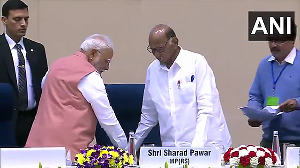A team of three Union ministers will hold talks on Monday with a delegation of farmer leaders, who are planning to march towards Delhi to press for their demands.

Meanwhile, tractor-trolleys in large numbers set out from different parts of Punjab in the morning to join the march.
Haryana authorities have fortified the state's border with Punjab at many places in Ambala, Jind, Fatehabad and Kurukshetra using concrete blocks, iron nails and barbed wire to scuttle the farmers' proposed 'Delhi Chalo' march on February 13.
The Haryana government has also imposed restrictions under Section 144 of the Code of Criminal Procedure (CrPC) in as many as 15 districts, prohibiting the assembly of five or more people in 15 districts and banning any kind of demonstration or march with tractor-trolley.
The Samyukta Kisan Morcha (Non-Political) and the Kisan Mazdoor Morcha have announced that more than 200 farm unions would head to Delhi on February 13 to press the Centre to accept several demands, including the enactment of a law to guarantee a minimum support price (MSP) for crops.
Union ministers Piyush Goyal, Arjun Munda and Nityanand Rai are scheduled to arrive in Chandigarh on Monday to hold a second round of talks with the farmer leaders to discuss their demands. The meeting will be held at the Mahatma Gandhi State Institute of Public Administration in Sector 26 at 5 pm.
Kisan Mazdoor Sangharsh Committee general secretary Sarwan Singh Pandher Monday said a convoy of tractor-trolleys set out in the morning from Beas in Amritsar to assemble in Fatehgarh Sahib district.
Many farmers from Moga, Bathinda and Jalandhar districts have also started from their villages to join the march.
SKM (Non-political) leader Jagjit Singh Dallewal said tractor-trolleys will assemble at Fatehgarh Sahib district and Mehlan Chowk in Sangrur on Monday evening.
In the national capital, traffic restrictions have been put in place and security arrangements intensified at the Singhu, Ghazipur and Tikri borders ahead of the march to prevent vehicles carrying protesters from entering the city.
The first meeting of the farmer leaders and the three Union ministers was held on February 8.
Besides a legal guarantee for minimum support price (MSP), the farmers are also demanding the implementation of the Swaminathan Commission's recommendations, pensions for farmers and farm labourers, farm debt waiver, withdrawal of police cases and 'justice' for victims of the Lakhimpur Kheri violence.
The farmers have planned to head to Delhi from the Ambala-Shambhu border, Khanauri-Jind and the Dabwali border.
Dallewal slammed the Haryana government for making heavy security arrangements at the Punjab-Haryana borders and for allegedly "harassing" farmers who wanted to join the 'Delhi Chalo' march.
The government is holding a dialogue with farmers and yet, heavy barricading has been done at Punjab-Haryana borders, he said.
Putting the Haryana Police on alert in view of the proposed march, the state authorities have placed reinforced concrete barricades, barbed wire and anti-riot vehicles on the roads.
Near the Shambhu border, iron sheets have been installed along the two sides of the road on the Ghaggar flyover to prevent protesters from throwing police barricades off it. Water cannons and Vajra vehicles have been stationed and the Ghaggar river bed below has been dug up.
Police have also made elaborate arrangements at Haryana's borders with Punjab in Jind, Fatehabad, Kurukshetra and Sirsa districts.
Internet services and bulk SMS in seven districts -- Ambala, Kurukshetra, Kaithal, Jind, Hisar, Fatehabad and Sirsa -- have been suspended till February 13.
The Haryana Police has issued a traffic advisory, asking commuters to take alternative routes and plan their journey accordingly.
In 2020, a large number of farmers from Punjab and nearby areas of Ambala gathered at the Shambhu border and broke police barriers to march towards Delhi.
The farmers, mainly from Punjab, Haryana and Uttar Pradesh, held a year-long protest on Delhi's border points -- Singhu, Tikri and Ghazipur -- against the three now-repealed farm laws.











 © 2025
© 2025